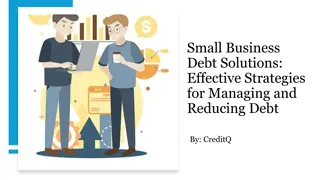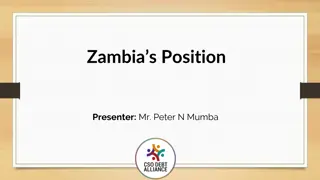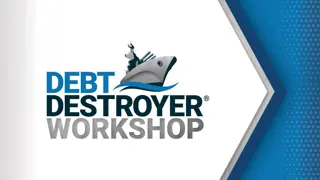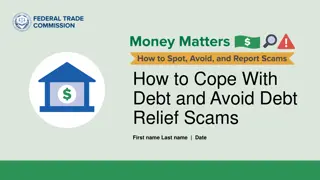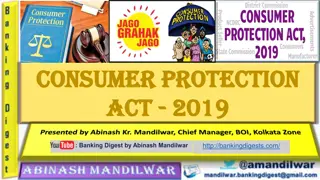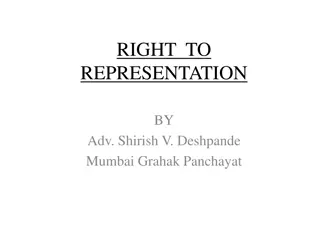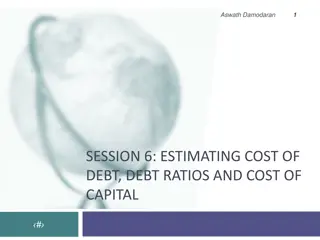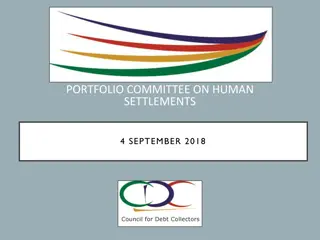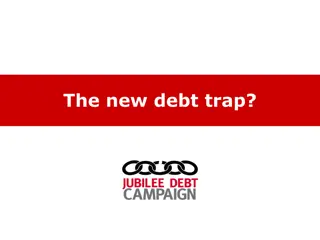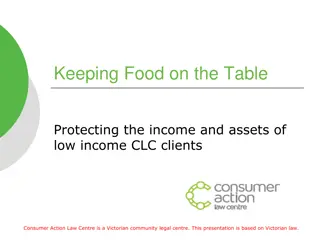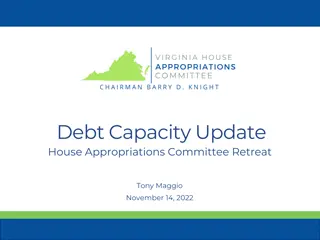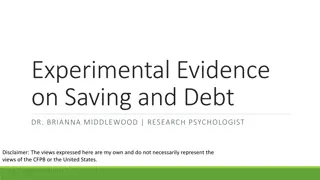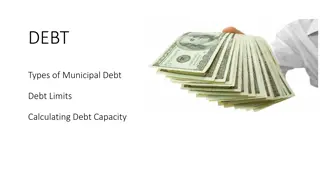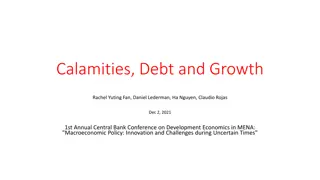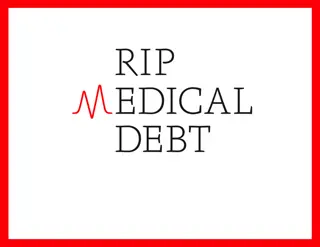Understanding Consumer Law and Debt Collection Practices in 2021
Explore key principles, roles, and terms in consumer law and debt collection, including the rights of consumers, the responsibilities of creditors, and the regulations governing debt collection practices under the FDCPA and WCA. Learn about verifying debt, the importance of accurate information, and how to seek legal protection when facing harassment or deceptive practices.
Download Presentation

Please find below an Image/Link to download the presentation.
The content on the website is provided AS IS for your information and personal use only. It may not be sold, licensed, or shared on other websites without obtaining consent from the author. Download presentation by click this link. If you encounter any issues during the download, it is possible that the publisher has removed the file from their server.
E N D
Presentation Transcript
Consumer Law 2021
Guiding Principles Consumer and debt collection issues exist in good economic times and in bad. All consumers have the right to be free from harassment in debt collection. All consumers have the right to make the choices that are best suited to their economic situation.
Role of EBS Assist in ghost-writing cease and desist letters Encourage prioritization of debt GWAAR will consider representing clients in small claims matters on a case-by-case basis. Contact your supervising attorney Assistance with post-judgment financial disclosure forms upon discussions with your supervising attorney Assist with discharge of student loan debt on basis of disability Provide accurate information about legal processes and any local resources that might be able to help
Key Terms Debtor: Individual who owes the debt. Spouses in Wisconsin are financially responsible for most debts of the other spouse. Creditor: Person or entity to whom a debt is owed or who offers or extends credit creating a debt. Secured Debt: Debt for which specific collateral has been pledged by the debtor. Unsecured Debt: Debt for which no specific collateral has been pledged by the debtor. Debt Collector: Any person or entity where the principal purpose is to collect debts or attempt to collect debts owed to another includes law firms and third parties hired by creditors. Judgment: Court order that requires payment of money or delivery of property to satisfy debt; enables creditor to force payment through various means. Garnishment: Legal proceeding in which judgment creditor obtains court order to require a third party (bank or employer) to pay the creditor from the consumer s income or account.
Sources of Law - FDCPA Fair Debt Collection Practices Act (FDCPA) Federal law governing communication and conduct of third-party debt collectors (not creditors) when collecting debts from consumers. Prohibits debt collectors from using abusive, unfair or deceptive practices to collect from a consumer If a consumer believes their rights under FDCPA have been violated (contact your supervising attorney) and a complaint may be filed with the Consumer Financial Protection Bureau and the Wisconsin Dept. of Financial Institutions
Sources of Law - WCA Wisconsin Consumer Act (WCA) State law governing debt collection practices in Wisconsin. This law applies to debt collectors as well as creditors Overlaps with FDCPA prohibits harassing or abusive conduct Applies to any entity attempting to collect a consumer debt
Verifying Debt FDCPA: 30 days from initial notice from collection agency After 30 days, agency assumes debt is valid & begins collection activity (does not mean that consumer admits liability) If consumer request verification within 30 days, collections agency must cease collection until verification is mailed to consumer No deadline for collection agency to respond
Cease and Desist Letters Used to stop the calls and letters from debt collectors After letter is sent, only communication can be that they are going to file a lawsuit Best practice is to have an initial conversation with the collector to 1) verify the debt and 2) see if the debt can be resolved (payment plan, lump sum payment, etc.)
Lawsuit Creditor may file a claim in court (small claims if $10k or less) in attempt to collect unpaid debt Lawsuit is initiated when a complaint is filed with county courthouse Debtor will be served with summons and complaint and have set amount of time to respond Default judgment will be entered if debtor does not respond or show up at designate court date
Lawsuit Contd If judge finds in favor of creditor, judgment will be entered in his favor Judgment needs to be entered for more aggressive collection tactics to take place Financial disclosure usually mailed 1 month after judgment client must fill this out We may help explain the court process to debtors and provide tips, but generally will not personally represent
Reopening Judgment Wis. Stat. 806.07 Very difficult, court has discretion Must file within 1 year, the sooner the better
Judgment Lien Gives the creditor the right to be paid a certain amount of proceeds from the sale of debtor s property In Wisconsin, 10 year lien on real estate in a given county First $75,000 of a home is exempt
Garnishment Federal Benefits Exempt from Garnishment: Generally speaking, these benefits are exempt from garnishment but may be garnished for certain debts such as delinquent taxes, alimony, child support or student loans. Social Security Benefits SSI Benefits Veterans Benefits Civil Service and Federal Retirement and Disability Benefits Military Annuities and Survivors Benefits FEMA Federal Disaster Assistance 2020 Economic Impact Payments talk to BSSA!
Garnishment Contd Exemptions from earnings garnishment - 80% of earnings are generally exempt - 100% of earnings are exempt if: debtor s household income is below the poverty line, or Debtor received Foodshare, Medicaid, SSI, or W-2 assistance within 6 months prior to garnishment
Collection Proof Many low-income clients will be collection proof meaning that their earnings are so low that they cannot be garnished or only sources of income are exempt Ok to tell someone they are likely collection proof based on information provided, but never guarantee Also good to inform collection agency that debtor is likely collection proof Although a person may be collection proof, it does not mean debt goes away!
CARES Act and Debt Collection CARES Act protections last from 1/31/2020 until 120 days after the termination of the COVID-19 national emergency Borrowers in good standing apply for a modified payment agreement; lenders will report the payment status as current with the credit reporting bureaus Borrowers who are behind can request a modified payment plan going forward; account will remain delinquent unless they get caught up but accommodation will prevent delinquent status from advancing Lenders cannot report a consumer as delinquent during accommodation period if consumer met all terms of the accommodation Accommodations are required for federally backed mortgage loans (automatic for federally held student loans through 9/30/2020)
Federal Student Loans Federal student loans may be discharged if a person is deemed totally and permanently disabled Person must submit TPD application to the Department of Education Can show TPD via 1) veterans disability determination, 2) SSA disability determination, or 3) physician certification Department of Ed uses this information to make own determination of TPD. If approved, debt from federal loans will be discharged More information http://www.disabilitydischarge.com/home/
Foreclosure Roadmap 1. 2. 3. 4. 5. Missed mortgage payment ~ 3 months later, lender issues Notice of Default If default is not cured, lender may file a foreclosure lawsuit Judgment entered if parties unable to resolve Redemption Period begins property owner must pay foreclosure judgment amount Length will be in complaint; 6-12 mos for mortgages before 4/27/2016, 3-6 mos for mortgages after that Can attempt to refinance or sell Might be able to request extension if attempting to sell Notice of Sheriff s Sale Property sold at Sheriff s Sale Owner is evicted from premises 6. 7. 8.
Reverse Mortgages Available to homeowners age 62+ Enables you to convert a portion of the equity in your home to cash When the borrower dies or is no longer using the home as primary residence (nursing home), the amount withdrawn (plus interest and charges) must be repaid to the bank
Medical Debt Provider: See if any assistance available or discounts Collection Agency: Installments or reduced payoff amount Need a judgment from court in order to garnish SSA benefits generally cannot be garnished medical debt is not an exception
Government Imposter Scams Scammers pretend to be government officials to get victim to send them money or provide personal information. Victims who refuse to cooperate are threatened with arrest, license suspension, frozen accounts, lost benefits, etc. IRS: Caller claims to be IRS employee. Victim is told they owe money to the IRS and it must be paid promptly via wire transfer or through a gift card. SSA: Caller claims to be SSA employee and says the victim s SSN has been frozen because of suspicious activity or because it was used in a crime. They ask to confirm SSN or say they need to withdraw money from the victim s bank account/victim needs to send gift cards to safeguard money. Medicare: Caller claims to be Medicare employee. Beneficiary is told that they need to verify personal information or pay a processing fee to get their new card, activate their new card, or upgrade to a plastic card (all cards are paper!). Another trick is to claim there s been suspicious activity on victim s Medicare account, and they need to verify identity to avoid losing benefits. Law enforcement: Caller claims victim has warrants for their arrest or that they owe the government money. Victim is instructed to wire money or purchase gift cards and give the caller the code number on the back.
Family Emergency Scams Scammers pose as relatives (grandchildren) or friends, calling or sending messages to ask you to send money immediately. They ll say they need cash to help with an emergency, like getting out of jail, paying a hospital bill, or needing to leave a foreign country. The goal is to trick victims into sending money before they realize it s a scam.
Tech Support Scams Phone call from someone claiming to be a computer technician or an internet pop-up message warning about non-existent computer problems (viruses, malware, hacking attempt, etc.) Ask victim to give them remote access to his or her computer and then: Install malware that gives them access to computer and sensitive data Try to sell software or repair services that are worthless or available elsewhere for free Try to enroll you in a worthless computer maintenance or warranty program Ask for credit card information so they can bill for phony services or services available elsewhere for free Direct victim to websites and ask them to enter credit card, bank account, or other personal information
Romance Scams Scammers use fake profiles on dating sites or social media sites to meet potential victims. They usually say they re living or traveling outside of the United States (work in construction or oil industry, in the military, a doctor with an international organization, etc.). They build relationship with their targets to build their trust, sometimes talking or chatting several times a day but never want to meet in person. Eventually, they convince victims to send money.
Reporting Scams Federal Trade Commission https://www.ftccomplaintassistant.gov/#crnt&panel1-1 WI Dept. of Agriculture, Trade, & Consumer Protection https://datcp.wi.gov/Pages/Programs_Services/FileCon sumerComplaint.aspx Local law enforcement
Identity Theft Happens when someone steals victim s personal information and uses it without your permission, can wreak havoc on a person s finances and credit history. Advice to Offer Victim of Identity Theft Place an initial fraud alert: ask 1 of 3 credit reporting companies to put out a fraud alert on credit report. They must tell the other 2 companies and this will make it more difficult for the thief to open accounts in their name. Order a credit report: This should be free (1) after an initial fraud alert is placed. (Free weekly through April 2021.) Contact related businesses if person knows which accounts have been tampered with. Contact the fraud department of the business and follow- up with a certified letter. Create an identity theft report with the Federal Trade Commission Consider placing a free freeze on credit report contact each credit reporting company



